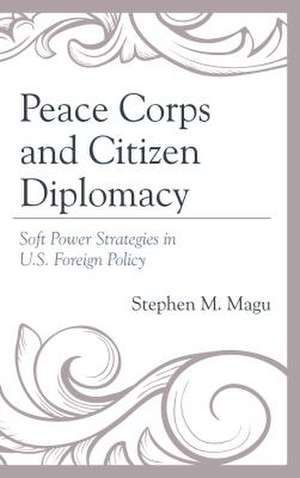PEACE CORPS AMP CITIZEN DIPLOMACCB
Autor Stephen M. Maguen Limba Engleză Hardback – mai 2018
Preț: 684.94 lei
Preț vechi: 889.53 lei
-23% Nou
Puncte Express: 1027
Preț estimativ în valută:
131.10€ • 142.46$ • 110.20£
131.10€ • 142.46$ • 110.20£
Carte tipărită la comandă
Livrare economică 21 aprilie-05 mai
Preluare comenzi: 021 569.72.76
Specificații
ISBN-13: 9781498502405
ISBN-10: 1498502407
Pagini: 246
Dimensiuni: 152 x 229 x 21 mm
Greutate: 0.49 kg
Editura: Rowman & Littlefield
ISBN-10: 1498502407
Pagini: 246
Dimensiuni: 152 x 229 x 21 mm
Greutate: 0.49 kg
Editura: Rowman & Littlefield
Notă biografică
Cuprins
Descriere
This book assesses the contribution of soft powers, such as foreign aid and diplomacy, to United States foreign policy strategies. Since 1945, soft power of citizen diplomacy has become an increasingly useful, and is an indispensable tool in the foreign policy toolbox.
